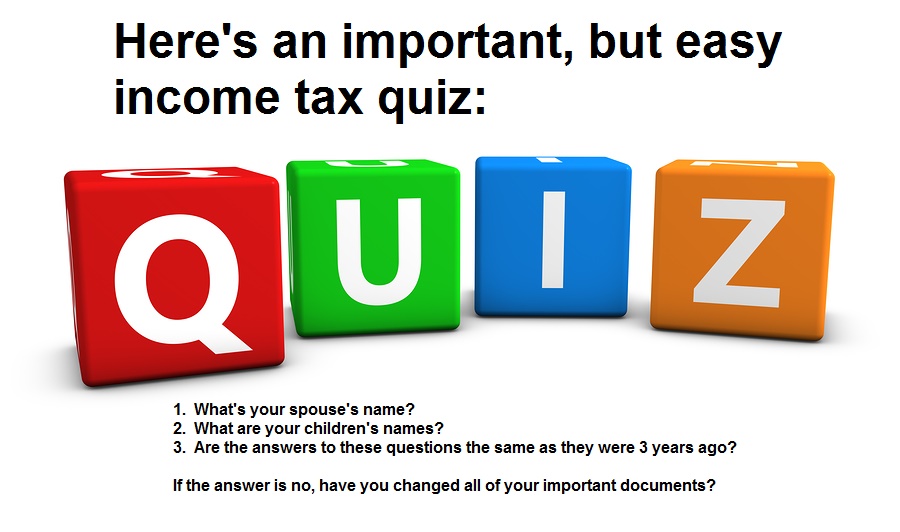Here’s an easy Tax Quiz.
1. Are you married? What’s your spouse’s name?
2. Do you have children? What are their names?
I told you this was an easy quiz. Now here’s the next part: same questions, but what would the answers have been three years ago? Any changes? If your answers have changed over the past few years, here’s a tougher question for you; did you change your will? How about your 401(k)? Your insurance policy?
You see, it happens to everyone. Our families change, we have children, we get divorced, we get remarried, people die. If we don’t manually go in and adjust who the beneficiaries are on our bank accounts, retirement plans, and such, then the money that we’ve worked so hard to save and care for our families might go to the wrong people.
It happens all the time. A man dies, and accidentally leaves a million dollar life insurance policy to his ex-wife. Perhaps his IRA goes to his dead brother. Or maybe he’s left his entire estate to his three eldest children completely leaving the youngest out of the will because he forgot to change it when the baby was born.
I’m not just giving you “what ifs”. These are all real examples that happened to real people that I know. The ex-wife had been divorced for five years, the dead brother had been gone for ten years, and the baby was twenty years old when her father passed away.
We all like to think that if we died, our family members would do the honorable thing and share accordingly. Hopefully they will, but it’s still better to put your wishes in writing with the proper documents. Even if your family does have the best intentions, and the highest level of integrity, if you don’t take care of assigning your beneficiaries, your assets will be left for state law to divide.
Let’s say you have no problem with your state laws and you agree with how the state determines the way your assets will be split. Fine. Of course, it could take years for the state to decide how to split your assets once you’re dead and your family could starve to death waiting. Let’s say you die and there’s no determination as to who your beneficiaries are. Generally, it takes about a year to get your assets out of probate, but I once worked on a case that took three years. For those three years, you know who got paid? I got paid for doing the tax returns, the financial manager got paid for handling the money in the account and the lawyers got paid a bundle.
You know who else got paid? The IRS got paid because the income from the assets in the account got taxed at the highest rate because we couldn’t pass any money through to the family. The family got nothing until the estate was closed. All that money eaten away by lawyers, number crunchers, and the IRS– what a waste. Is that really the choice you’d make?
So here’s your little Roberg Tax to do list. Check your life insurance policy. Check your retirement plan. Check your investment and bank accounts. And, check your will. Make sure that the people you have listed as your beneficiaries are the people that you want to receive your money when you die. If you’ve got the wrong people listed, you need to make some changes.
Your family loves you. They’d much rather have you be alive than be your beneficiary. But, because you love them too, make sure you take care of that paperwork.


